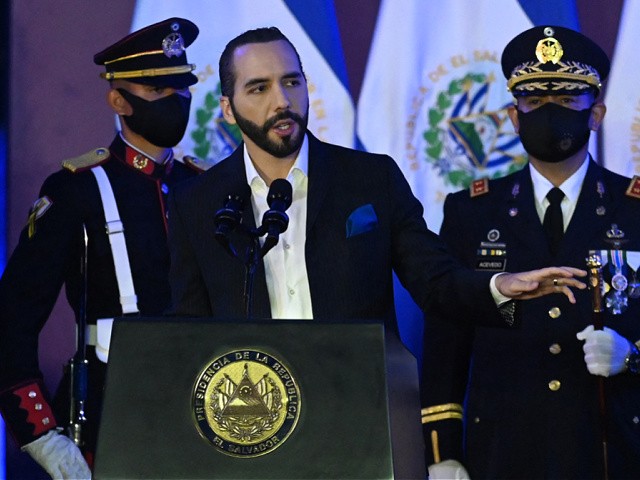El Salvador on Friday moved the first 2,000 inmates to the new Center for the Confinement of Terrorism (CECOT), a 40,000-bed “mega prison” larger than all 20 of the country’s existing prisons combined. Over 64,000 suspects have been arrested in President Nayib Bukele’s crackdown on gang violence.
Bukele posted photos and video of the prison transfer on Twitter, declaring the CECOT will “be their new home, where they will live for decades, mixed today, unable to do any more harm to the population.”
Hoy en la madrugada, en un solo operativo, trasladamos a los primeros 2,000 pandilleros al Centro de Confinamiento del Terrorismo (CECOT).
Esta será su nueva casa, donde vivirán por décadas, mezclados, sin poder hacerle más daño a la población.
Seguimos…#GuerraContraPandillas pic.twitter.com/9VvsUBvoHC
— Nayib Bukele (@nayibbukele) February 24, 2023
Bukele clearly felt images of the humiliating prison transfer would send an intimidating message to gangsters, so he made a point of tweeting and retweeting as many photos as possible:
In less than a year Nayib Bukele has turned El Salvador-the most violent country on Earth-into the safest place in the Americas. 1000s of gang members have been moved to a newly opened “mega prison”, which holds a maximum capacity of 40,000- The largest facility in the Americas. pic.twitter.com/RlKJibS4aT
— Mitchell Nicholas Gerber (@TruthSeeker077) February 26, 2023
El Salvador’s government moved thousands of suspected gang members to a newly opened ‘mega prison,’ the latest step in a controversial crackdown on crime that has caused the Central American nation’s prison population to soar https://t.co/IUL4xjinr5 pic.twitter.com/c7pYyNASBR
— Reuters (@Reuters) February 25, 2023
“Look at these terrorists. They’re not scary anymore, are they?” Bukele said on Saturday. “Exactly! Criminals do not cause any fear once they are deprived of the protection of the State, and the corrupt politicians and international organizations that finance and defend them.”
On Monday, Bukele pointed out that, according to his government’s statistics, there were zero homicides in El Salvador last week.
“Thank God,” he said, preemptively deflecting criticism from humanitarian groups over the stark photos and videos from CECOT.
Unos 2.000 presuntos pandilleros fueron trasladados este viernes a la megacárcel recientemente inaugurada por el gobierno de #ElSalvador.
“Este será su nuevo hogar, donde no podrán hacer más daño a la población”, dijo a través de su cuenta de Twitter el presidente @nayibbukele. pic.twitter.com/5tJlfPgzEv
— Voz de América (@VozdeAmerica) February 24, 2023
Bukele has boasted the CECOT, constructed with impressive speed after he secured emergency powers to combat gang violence a year ago, is inescapable.
“Just as at the beginning of the pandemic, we built the largest hospital in Latin America to care for Covid-19 [sic] patients in record time, now we must build a prison to intern the tens of thousands of terrorists who stalked our country,” he said when announcing construction of the huge new prison in June.
The BBC noted the new prison was designed to hold over 100 prisoners in each of its 1,000-square-foot cells, which “only have two sinks and two toilets each.”

Salvadoran President Nayib Bukele (MARVIN RECINOS/AFP via Getty Images)
Salvadoran prison officials say the facility includes factory work areas, which will doubtless raise concerns from human rights groups about forced labor.
Juan Pappier of Human Rights Watch (HRW) told the Washington Post on Sunday the new prison is a “symbol of Bukele’s mad security policies.”
“There’s every reason to suspect the timing of the prison transfer was all about controlling the narrative and presenting an ‘iron fist’ interpretation of Bukele that fails to encapsulate the whole picture,” he charged.
Pappier was alluding to a U.S. federal indictment against leaders of the infamous MS-13 gang on Thursday, which included allegations that Salvadoran officials negotiated with gang leaders to reduce violence. Pappier evidently did not cite his evidence for believing the prison transfer was merely a distraction from this story, or how it could have been arranged so quickly if that were the case.
“Security forces have detained hundreds of Salvadorans with no connection to gangs, held them incommunicado, tortured some of them in prison, and subjected detainees to Kafkian legal proceedings that makes it difficult, if not impossible, for them to defend themselves,” Pappier said, an allegation with some more substantiation from human rights investigators and leaked Salvadoran government documents.
President Bukele remains the best-evaluated president in Latin America. CID Gallup. https://t.co/KclCyHbwDV via @EHGaldamez pic.twitter.com/deLFIRNs4h
— El Salvador News (@El_SalvadorNEWS) October 14, 2022
Bukele and his war on gangs remain overwhelmingly popular with the people of El Salvador. A Gallup survey released in early February gave Bukele a 90-percent approval rating, the highest of any leader in the hemisphere by a considerable margin, and possibly the highest ratings of any leader in El Salvador’s history. He is heavily favored to win re-election next year.
Other recent polls revealed strong public support for Bukele’s war on gangs and that few Salvadorans believe the accusations that his government has made deals with gang leaders.
In early February, a Salvadoran newspaper called El Faro that is generally critical of Bukele reported that gangs have virtually disappeared “communities across the country.”
“El Salvador seems to have destroyed the territorial reach and centralized leadership of the notorious MS-13 and 18th Street gangs,” El Faro conceded, quoting gang leaders who said Bukele has “ruined” their operations, and citizens who said they can once again walk free in towns that were once gangland nightmares.
“The gangs as we knew them, as a national structure, no longer exist. What’s left is a vestige,” a veteran police officer told the newspaper.
